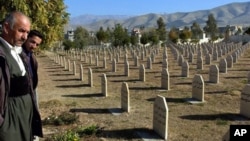For two days, Iraqi government forces had subjected the Kurdish city of Halabja to a steady barrage of rocket attacks. But early on the evening of March 16, 1988, aircraft began to pepper the city with canisters of chemical weapons including mustard gas and the nerve agents sarin, tabun and VX. That day, some 5000 people died within minutes. Another 7000 were injured or crippled.
The chemical attack on Halabja took place 25 years ago today. It was the height of Iraqi leader Saddam Hussein’s al-Anfal operation, a genocidal campaign against the Kurds and other ethnic groups in Northern Iraq. In 1986, in order to rid himself of a troublesome population, Saddam Hussein ordered that the Iraqi armed forces turn their weapons against their fellow citizens. Then, early in 1987, Saddam Hussein authorized the use of chemical weapons in attacks on as many as 24 Kurdish villages.
Under the leadership of the Dictator’s cousin, Ali Hassan al-Majid, the Iraqi army systematically destroyed villages, and deported, incarcerated in concentration camps, starved and executed thousands of people. The gassing of the population of Halabja was the worst atrocity of a campaign that resulted in the deaths of some 182,000 people, most of them Kurdish civilians.
For his part in these crimes and more, Ali Hassan al-Majid, known as Chemical Ali for his propensity to use poison gas, was executed. Saddam Hussein, too, was tried for numerous crimes, including crimes perpetrated by his orders against the Iraqi people. He too was executed.
The head of government has a responsibility to his country, and to his people, to act in their best interest. Ultimately, few dictators die in bed, or exit the scene of their crimes gracefully. The fate of the instigator of al-Anfal and the killer of Halabja serves as a warning to others who follow in their murderous footsteps.
The chemical attack on Halabja took place 25 years ago today. It was the height of Iraqi leader Saddam Hussein’s al-Anfal operation, a genocidal campaign against the Kurds and other ethnic groups in Northern Iraq. In 1986, in order to rid himself of a troublesome population, Saddam Hussein ordered that the Iraqi armed forces turn their weapons against their fellow citizens. Then, early in 1987, Saddam Hussein authorized the use of chemical weapons in attacks on as many as 24 Kurdish villages.
Under the leadership of the Dictator’s cousin, Ali Hassan al-Majid, the Iraqi army systematically destroyed villages, and deported, incarcerated in concentration camps, starved and executed thousands of people. The gassing of the population of Halabja was the worst atrocity of a campaign that resulted in the deaths of some 182,000 people, most of them Kurdish civilians.
For his part in these crimes and more, Ali Hassan al-Majid, known as Chemical Ali for his propensity to use poison gas, was executed. Saddam Hussein, too, was tried for numerous crimes, including crimes perpetrated by his orders against the Iraqi people. He too was executed.
The head of government has a responsibility to his country, and to his people, to act in their best interest. Ultimately, few dictators die in bed, or exit the scene of their crimes gracefully. The fate of the instigator of al-Anfal and the killer of Halabja serves as a warning to others who follow in their murderous footsteps.






